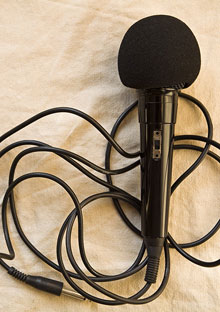Celebrate Our National Day of Listening

Photo:© 2009 Jupiterimages Corporation
If your grandfather stormed the beaches at Normandy, if your aunt was a Freedom Rider, or even if your parents have a priceless how-we-met story—now's your chance to preserve the tale for posterity. On November 27, celebrate the National Day of Listening by recording a talk with a family member, loved one, or friend with StoryCorps, the nonprofit oral-history project that has captured more than 23,000 such conversations on CD for preservation in the Library of Congress. To find a StoryCorps mobile recording booth near you or download a guide to recording at home, go to Storycorps.org, where you can also browse scores of audio memoirs by Americans of all ages and cultures.
Here's a sampler:
The Reverend James Seawood remembers how African-American families were forced out of Sheridan, Arkansas, when its schools attempted to integrate.
"As a child, I would climb up on the lumber stack and look over at the white school. Huge school with a band, football team—everything that you could imagine. And here we were with our two-room school, outdoor toilets, and two teachers. As the black population in town went down, that left my mother at school as the principal, the janitor; she had to do everything. As long as there was one black child left in town, they had to keep the school open. So ten, nine, eight—Mother was there until the last child, the last family, was forced out of town."
Ten-year-old Ida Cortez talks about her dyslexia with her mother, Kim Wargo.
Kim: "I never believed that you wouldn't learn how to read.... But I did worry about whether you would ever love to read, because I love to read, and Dad does, and we wanted you to have that."
Ida: "Now I'm probably one of the biggest readers in my class!... I want to be a teacher and help people do spelling and reading, because those were so hard for me. I've learned that I can work hard.... It's not easy—it's not easy for anyone. But I can do it."
New York City cabdriver Oleg Roitman chats about entertaining his passengers.
"My nickname is the Human Computer. If you tell me in Russian, Hebrew, or English the date of your birth, in less than a second I will tell you which day of the week you were born. To prove that my answers are correct, I carry a book with calendars from 1900 to 2020. [If a passenger says,] 'I was born on April 14, 1973,' I say, 'Saturday.' 'Oh, yes, yes, yes, correct!' he says. He pays me double the meter. I am probably the slowest driver on the road, but very often people tell me, 'You are the best cabdriver of my life.'"
More from StoryCorps: How to interview your own family
Here's a sampler:
The Reverend James Seawood remembers how African-American families were forced out of Sheridan, Arkansas, when its schools attempted to integrate.
"As a child, I would climb up on the lumber stack and look over at the white school. Huge school with a band, football team—everything that you could imagine. And here we were with our two-room school, outdoor toilets, and two teachers. As the black population in town went down, that left my mother at school as the principal, the janitor; she had to do everything. As long as there was one black child left in town, they had to keep the school open. So ten, nine, eight—Mother was there until the last child, the last family, was forced out of town."
Ten-year-old Ida Cortez talks about her dyslexia with her mother, Kim Wargo.
Kim: "I never believed that you wouldn't learn how to read.... But I did worry about whether you would ever love to read, because I love to read, and Dad does, and we wanted you to have that."
Ida: "Now I'm probably one of the biggest readers in my class!... I want to be a teacher and help people do spelling and reading, because those were so hard for me. I've learned that I can work hard.... It's not easy—it's not easy for anyone. But I can do it."
New York City cabdriver Oleg Roitman chats about entertaining his passengers.
"My nickname is the Human Computer. If you tell me in Russian, Hebrew, or English the date of your birth, in less than a second I will tell you which day of the week you were born. To prove that my answers are correct, I carry a book with calendars from 1900 to 2020. [If a passenger says,] 'I was born on April 14, 1973,' I say, 'Saturday.' 'Oh, yes, yes, yes, correct!' he says. He pays me double the meter. I am probably the slowest driver on the road, but very often people tell me, 'You are the best cabdriver of my life.'"
More from StoryCorps: How to interview your own family



